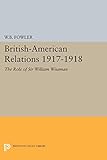British-American Relations 1917-1918 : The Role of Sir William Wiseman. Supplementary Volume to The Papers of Woodrow Wilson / Wilton B. Fowler.
Material type: TextSeries: Princeton Legacy Library ; 1959Publisher: Princeton, NJ : Princeton University Press, [2015]Copyright date: ©1969Description: 1 online resource (350 p.)Content type:
TextSeries: Princeton Legacy Library ; 1959Publisher: Princeton, NJ : Princeton University Press, [2015]Copyright date: ©1969Description: 1 online resource (350 p.)Content type: - 9780691621692
- 9781400876501
- 327.42/073 22
- online - DeGruyter
- Issued also in print.
| Item type | Current library | Call number | URL | Status | Notes | Barcode | |
|---|---|---|---|---|---|---|---|
 eBook
eBook
|
Biblioteca "Angelicum" Pont. Univ. S.Tommaso d'Aquino Nuvola online | online - DeGruyter (Browse shelf(Opens below)) | Online access | Not for loan (Accesso limitato) | Accesso per gli utenti autorizzati / Access for authorized users | (dgr)9781400876501 |
Frontmatter -- Acknowledgments -- Contents -- Note on footnote citations -- Chapter One. Introduction -- Chapter Two. Wiseman and the Beginning of the War Partnership -- Chapter Three. Dollars in Diplomacy -- Chapter Four. Reading's Assignment, Wiseman's Accomplishment -- Chapter Five. Attempts at Unity -- Chapter Six. American Manpower: Source of Strength and Division -- Chapter Seven. Intervention in Russia -- Chapter Eight. The Approach of Peace -- Chapter Nine. Envoy -- Appendix: Wiseman on Wilson (from the Wiseman Papers) -- Annotated Bibliography -- Index
restricted access online access with authorization star
http://purl.org/coar/access_right/c_16ec
Throughout the First World War Woodrow Wilson considered Britain's ambitions in the war as objectionable as Germany's. He repeatedly expressed distrust of the British government's motives; for their part, the British chafed at Wilson's idealism and despised his aloofness from the Allies. Sir William Wiseman played an extraordinary part as the behind- the-scenes liaison between the two major powers. Acting as a personal friend and confidant of Wilson's adviser, Colonel House, Wiseman is credited with keeping animosities in check between America and Great Britain, and for helping to establish coalition diplomacy, which was new to the U.S. in 1917-1918, though within 25 years it became a permanent characteristic of American foreign policy. British-American Relations, 1917-1918 provides fascinating insights not only into Wiseman's role but into the entire diplomacy of the Wilson period.Originally published in 1969.The Princeton Legacy Library uses the latest print-on-demand technology to again make available previously out-of-print books from the distinguished backlist of Princeton University Press. These editions preserve the original texts of these important books while presenting them in durable paperback and hardcover editions. The goal of the Princeton Legacy Library is to vastly increase access to the rich scholarly heritage found in the thousands of books published by Princeton University Press since its founding in 1905.
Issued also in print.
Mode of access: Internet via World Wide Web.
In English.
Description based on online resource; title from PDF title page (publisher's Web site, viewed 30. Aug 2021)


